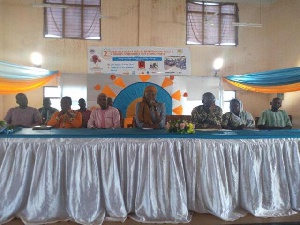 The conference was organised by NORSAAC
The conference was organised by NORSAAC
A group of young people from the northern region has called on government and stakeholders to help remodel socio-cultural practices that impede their access to sexual reproductive health services.
They said it would go a long way to overcome the stigma people put on young people who access reproductive health information from home and health care centres in the country.
They made the call at the weekend in Tamale at the closing ceremony of the Second Edition of the Northern Ghana (NORGHA) Sexual Reproductive Health and Rights (SRHR) Conference 2018 for Young People dubbed, "Overcoming Socio-cultural and Religious Barriers to Young People's Access to SRHR Information and Services in Ghana; the Position of the Young People".

The conference, which brought together a total of 248 young people with the ages of 15 to 30, created an opportunity for young people to interact and engage stakeholders in demanding for a suitable and enabling environment for the enhancement of SRHR information and services.
The conference was organised by the Northern Sector Action on Awareness Centre (NORSAAC) in collaboration with the United Nations Population Fund (UNFPA), Global Platforms, Action Aid, Regional Advisory Information and Network Systems (RAINS), Youth Empowerment For Life (YEFP), Ghana Health Service (GHS) and other stakeholders.
The group said religious and traditional leaders were still intimidating health care centres, NGOs and even young people on issues of reproductive health.
They said Chiefs, religious leaders and teachers still interfered in sexual harassment cases making the rate of teenage pregnancy, early marriage, rape and defilement rampant.
"There is still unfriendly health care service providers who push young people away from health care centres leaving us vulnerable to peer misguidance " they said.
Mr Mohammed Abdul Muhaimin, a representative from the Northern RegionHouse of Chiefs thanked NORSAAC and its partners for using NORGHA 2018 to empower the youth on their needs to accessing SRHR information and services
He also assured the young people that the regional house of chiefs shall do their best to come out with strategies of curbing the negative Socio-cultural practices affecting their access to sexuality issues.
Mrs Agnes Loriba, the Programmes Manager, CARE International and a member of the Civil Society Organisation (CSOs) platform on Sustainable Development Goals (SGDs) also assured that they would push the petitions made by the young people to the right stakeholders and government institutions for the petition's realisation.
Mr Alhassan Mohammed Awal, the Executive Director of NORSAAC urged the young people to go out to their communities to educate and empower their colleagues on what they had learned during the conference and said NORGHA 2019 would expect to have a minimum of 500 participants of young people and called on more partners and sponsors to help them to mobilise resources to make it a reality.
During an interaction session on the young people's experiences in the conference, Ms Issah Ihlass , a student of Business Senior High School, said she had learned that practising family planning was not a bad thing as most people perceived it to be, as it helped in childbirth spacing.
Master Amadu Hamdan, a student of Emmanuel Foundation Senior High School, said the conference had made him realise that interior decoration and art work could be done by both males and females
"I never knew a man could be a decorator. I thought it was the work of the ladies, but when I entered the class of art and decoration I saw that a woman was facilitating the art work and a man facilitating the decoration work " he said.
Madam Memunat a student from the University for Development Studies said she had learned that all young people had the right to visit any health centre to seek for services on their sexual reproductive health without any intimidation from health care service providers.
Master Naazo Lukman Fuseini, a student from Bolga Polytechnic said he had socialised and networked with a lot his colleagues and some of the stakeholders who took part in the conference that had enriched him with skills such as art work, Information Communication and Technology (ICT) interior decoration and event organisation.
Master Fuseini said the conference had therefore given them the responsibility to go out and educate their colleagues in their communities what they had learned most especially educating them on their SRHR to help them demand for those information and services.












